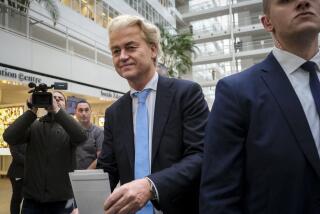German chancellor’s party defeated in state election
German Chancellor Angela Merkel was dealt a humiliating defeat Sunday when voters booted her party from power in a state election that could bode ill for her leadership on the national stage.
Merkel’s Christian Democrats had governed the affluent southwestern state of Baden-Wuerttemberg without interruption for nearly 60 years. But anger over her government’s policy on nuclear power and an ineffective campaign by the local party led voters to deprive conservatives of enough seats to form another ruling coalition in the state assembly, according to projected vote tallies Sunday evening.
Instead, the Green Party is poised to capture its first governorship in Germany. Although the Greens received a smaller share of the vote than the Christian Democrats, the environmental party performed best of the left-leaning groups and holds the strongest claim to head the new government.
“We have secured what amounts to a historic electoral victory,” Winfried Kretschmann, the Greens’ leader in the state, told party members in Stuttgart, the state capital.
The outgoing governor, Stefan Mappus, who critics said ran an unfocused campaign and made gaffes, conceded defeat. It was particularly bitter because only a few weeks ago, polls showed that the Christian Democrats stood a fair chance of holding onto power, though barely.
The Christian Democrats’ coalition partner, the pro-business Free Democrats, also suffered an alarming drop in votes in Sunday’s election.
The result is a rude wake-up call for Merkel because her government in Berlin is composed of the same combination of parties as the defeated coalition in Stuttgart. Both the Christian Democrats and the Free Democrats have seen their poll numbers fall in recent months as a result of government missteps and scandals.
In Baden-Wuerttemberg, much of the popular discontent has focused on nuclear power.
A majority of Germans opposes atomic energy, an aversion that has increased since the March 11 earthquake and tsunami in Japan, which damaged several reactors. Earlier this month, tens of thousands of protesters formed a human chain around one of several nuclear plants in Baden-Wuerttemberg.
Merkel announced that Germany would reexamine its nuclear power stations and suspend operations at some of them. The decision was an abrupt about-face from last year, when Merkel incensed many of her compatriots by declaring that her government would extend the life of Germany’s nuclear plants by an average of 12 years.
In a second state election Sunday, voters in Rhineland-Palatinate returned the Social Democrats to power, although the Green Party also made gains.
More to Read
Start your day right
Sign up for Essential California for news, features and recommendations from the L.A. Times and beyond in your inbox six days a week.
You may occasionally receive promotional content from the Los Angeles Times.







